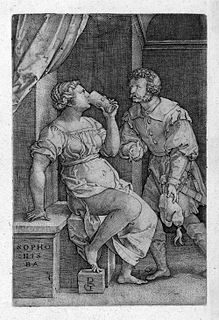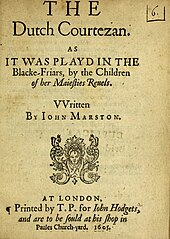This article contains information about the literary events and publications of 1613.

Étienne or Estienne de La Boétie was a French magistrate, classicist, writer, poet, and political theorist, best remembered for his intense and intimate friendship with essayist Michel de Montaigne. His early political treatise Discourse on Voluntary Servitude was posthumously adopted by the Huguenot movement and is sometimes seen as an early influence on modern anti-statist, utopian, and civil disobedience thought.

Temperance in its modern use is defined as moderation or voluntary self-restraint. It is typically described in terms of what an individual voluntarily refrains from doing. This includes restraint from revenge by practicing non-violence and forgiveness, restraint from arrogance by practicing humility and modesty, restraint from excesses such as extravagant luxury or splurging, and restraint from rage or craving by practicing calmness and self-control.

John Marston was an English playwright, poet and satirist during the late Elizabethan and early Jacobean periods. His career as a writer lasted only a decade. His work is remembered for its energetic and often obscure style, its contributions to the development of a distinctively Jacobean style in poetry, and its idiosyncratic vocabulary.
City comedy, also known as citizen comedy, is a genre of comedy in the English early modern theatre.

Eastward Hoe or Eastward Ho! is an early Jacobean-era stage play written by George Chapman, Ben Jonson and John Marston. The play was first performed at the Blackfriars Theatre by a company of boy actors known as the Children of the Queen's Revels in early August 1605, and it was printed in September the same year.
Greek love is a term originally used by classicists to describe the primarily homoerotic customs, practices, and attitudes of the ancient Greeks. It was frequently used as a euphemism for homosexuality and pederasty. The phrase is a product of the enormous impact of the reception of classical Greek culture on historical attitudes toward sexuality, and its influence on art and various intellectual movements.
'Greece' as the historical memory of a treasured past was romanticised and idealised as a time and a culture when love between males was not only tolerated but actually encouraged, and expressed as the high ideal of same-sex camaraderie. ... If tolerance and approval of male homosexuality had happened once—and in a culture so much admired and imitated by the eighteenth and nineteenth centuries—might it not be possible to replicate in modernity the antique homeland of the non-heteronormative?

A droll is a short comical sketch of a type that originated during the Puritan Interregnum in England. With the closure of the theatres, actors were left without any way of plying their art. Borrowing scenes from well-known plays of the Elizabethan theatre, they added dancing and other entertainments and performed these, sometimes illegally, to make money. Along with the popularity of the source play, material for drolls was generally chosen for physical humor or for wit.

Thomas Thorpe was an English publisher, most famous for publishing Shakespeare's sonnets and several works by Christopher Marlowe and Ben Jonson. His publication of the sonnets has long been controversial. Nineteenth-century critics thought that he might have published the poems without Shakespeare's consent; Sidney Lee called him "predatory and irresponsible." Conversely, modern scholars Wells and Taylor assert their verdict that "Thorpe was a reputable publisher, and there is nothing intrinsically irregular about his publication."

Antonio and Mellida is a late Elizabethan play written by the satirist John Marston, usually dated to c. 1599.

Parasitaster, or The Fawn is an early Jacobean play, written by the dramatist and satirist John Marston, probably in 1604, and performed by the Children of the Queen's Revels in the Blackfriars Theatre.

Jack Drum's Entertainment, or the Comedy of Pasquil and Katherine is a late Elizabethan play written by the dramatist and satirist John Marston in 1600. It was first performed by the Children of Paul's, one of the troupes of boy actors popular in that era.

The Wonder of Women or The Tragedy of Sophonisba is an early Jacobean stage play written by the satiric dramatist John Marston. It was first performed by the Children of the Revels, one of the troupes of boy actors popular at the time, in the Blackfriars Theatre.
A Mad World, My Masters is a Jacobean stage play written by Thomas Middleton, a comedy first performed around 1605 and first published in 1608. The title had been used by a pamphleteer, Nicholas Breton, in 1603, and was later the origin for the title of Stanley Kramer's 1963 film, It's a Mad, Mad, Mad, Mad World.
The Fair Penitent is Nicholas Rowe's stage adaptation of the tragedy The Fatal Dowry, the Philip Massinger and Nathan Field collaboration first published in 1632. Rowe's adaptation, premiered onstage in 1702 and first published in 1703, was a great popular success through much of the 18th century, and was praised by critics as demanding as Samuel Johnson.

Westward Ho is an early Jacobean-era stage play, a satire and city comedy by Thomas Dekker and John Webster that was first performed circa 1604. It had an unusual impact in that it inspired Ben Jonson, George Chapman and John Marston to respond to it by writing Eastward Ho, the famously controversial 1605 play that landed Jonson and Chapman in jail.
Love's Cure, or The Martial Maid is an early seventeenth-century stage play, a comedy in the canon of John Fletcher and his collaborators. First published in the Beaumont and Fletcher folio of 1647, it is the subject of broad dispute and uncertainty among scholars. In the words of Gerald Eades Bentley, "nearly everything about the play is in a state of confusion...."
May Day is an early 17th-century stage play, a comedy written by George Chapman that was first published in 1611.
The Insatiate Countess is an early Jacobean era stage play, a tragedy first published in 1613. The play is a problematic element in John Marston's dramatic canon.
The Dark Lady is a woman described in Shakespeare's sonnets, and so called because the poems make it clear that she has black wiry hair, and dark, "dun"-coloured skin. The description of the Dark Lady distinguishes itself from the Fair Youth sequence by being overtly sexual. Among these, Sonnet 151 has been characterised as "bawdy" and is used to illustrate the difference between the spiritual love for the Fair Youth and the sexual love for the Dark Lady. The distinction is commonly made in the introduction to modern editions of the sonnets. As with the Fair Youth sequence, there have been many attempts to identify her with a real historical individual. A widely held scholarly opinion, however, is that the "dark lady" is nothing more than a construct of Shakespeare's imagination and art, and any attempt to identify her with a real person is "pointless".











